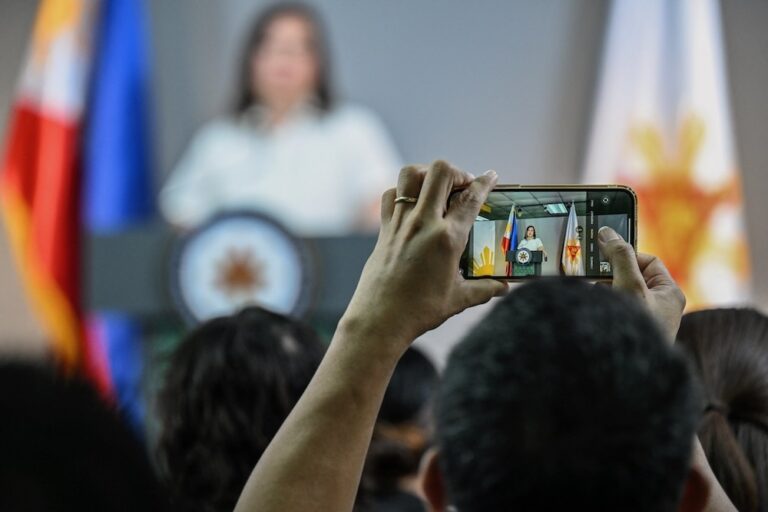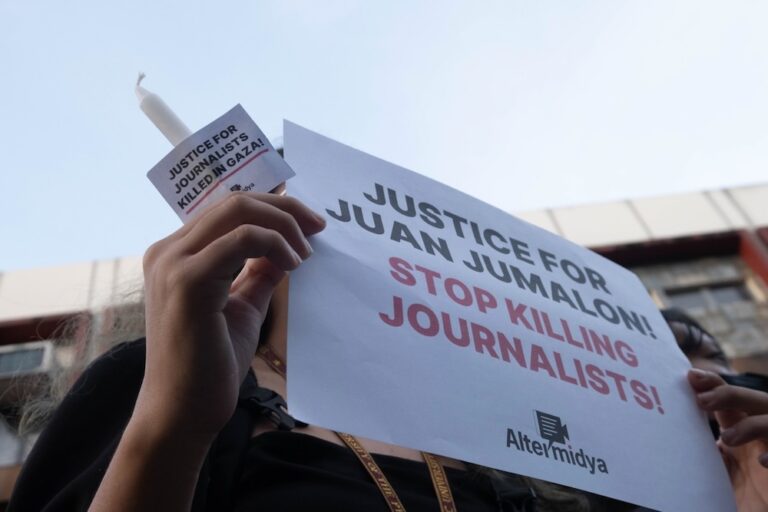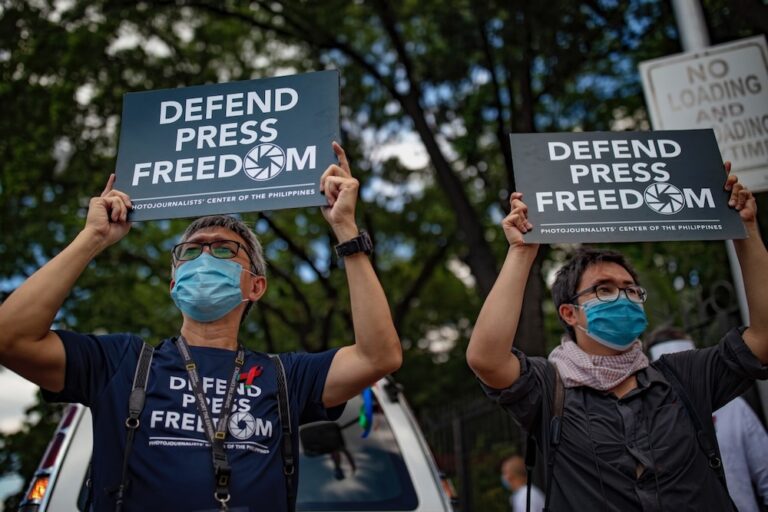(CMFR/IFEX) – Following the arrest of over 30 journalists and media technicians who were covering the takeover of a hotel by a group led by a former military officer who is now a senator, a high-ranking government official told journalists on 5 December 2007 that they could be arrested again if they defied police orders […]
(CMFR/IFEX) – Following the arrest of over 30 journalists and media technicians who were covering the takeover of a hotel by a group led by a former military officer who is now a senator, a high-ranking government official told journalists on 5 December 2007 that they could be arrested again if they defied police orders while covering similar events.
In a dialogue between members of the media and government held to discuss the arrest of journalists covering the 29 November takeover of the second floor of Manila’s Peninsula Hotel, Department of Interior and Local Government (DILG) Secretary Rolando Puno told journalists that the arrests were standard procedure and will happen again if media people defy police orders to leave the scene of similar events in future. The DILG is the government department with jurisdiction over the Philippine National Police (PNP).
“Their (journalists’) physical presence on the scene caused the obstruction of justice,” Puno declared before an audience of high-ranking police officials, media executives, and journalists’ groups.
In the original incident that led to the journalists’ arrest, Former Philippine Navy Lieutenant, now Senator Antonio Trillanes, Army General Danilo Lim and a military group called Magdalo which Trillanes leads, all walked out of a court hearing in dissatisfaction with the proceedings. Trillanes and the Magdalo group were being tried for a 2003 mutiny.
From the regional trial court, Trillanes, Lim, several Magdalo officers, and other sympathizers walked some two kilometers to The Peninsula Manila hotel where they demanded in a press conference that President Gloria Macapagal Arroyo step down and called on supporters to join them.
When an armoured personal carrier rammed through the hotel entrance and police SWAT teams fired tear gas and stormed the hotel, the Trillanes and Lim group surrendered, saying they did not want civilians hurt. Trillanes, Lim, and the Magdalo group were re-arrested and brought to a police camp about an hour away, together with the media people covering the event.
According to Puno, the media people, among whom were newspaper and television reporters, photographers, cameramen, and TV technical crew members, were handcuffed and arrested for “obstruction of justice” and “consistent and persistent refusal to obey” police orders.
“It was not the coverage that was the problem, but the physical presence of the media that caused obstruction,” Puno said. At the time of the arrests, Defense Secretary Gilberto Teodoro had said that the action was based on reports that there were Magdalo members posing as members of the media and that the government only intended to verify the identities of the media practitioners. Maria Ressa, senior vice-president for news and current affairs of broadcast giant ABS-CBN, said that ABS-CBN “in no instance ever obstructed justice or prevented authorities from taking action in Thursday’s standoff.” “ABS-CBN continued its live coverage because the public has the right to know,” Ressa said.
ABS-CBN, many of whose media personnel were arrested, is the biggest media conglomerate in the Philippines. “We calculated the risks, took precautions for our team, and made the choice to stay. We did our job to make sure that whatever actions both sides take, they are accountable to the people,” Ressa said.
After the arrests, the PNP “commanded” ABS-CBN in a 3 December letter to submit its raw footage of the 29 November standoff. Ressa said that “attempts to intimidate and harass journalists continue.” Department of Justice Secretary Raul Gonzalez had himself declared earlier that the PNP cannot compel ABS-CBN to release its video tapes. Gonzalez said all the PNP can hope for is for ABS-CBN to cooperate.
Various local media groups like the CMFR, the National Union of Journalists of the Philippines, the Philippine Press Institute and the National Press Club (NPC) have issued statements condemning the arrests.
The NPC also filed a complaint before the Commission on Human Rights against Puno, PNP chief Avelino Razon and other police officers for the media arrests, with charges of arbitrary arrest, violation of press freedom and illegal seizure of journalists’ technical equipment.
President Arroyo, however, reiterated that her government “wholeheartedly uphold(s) press freedom and the rule of law. We were not happy with the problem with the media involving police procedures even if it was just for a few hours,” Arroyo said, apparently referring to the arrest and detention of the journalists and media technicians covering the event.


